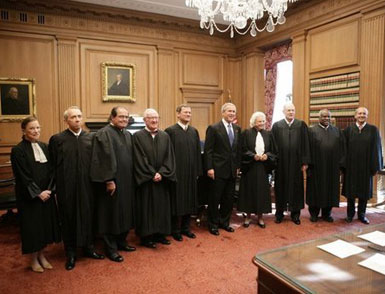
If confirmed, Alito would make for one less woman in this picture.
This was bound to be raised somewhere -- and we won't be better for pretending it isn't there. If Judge Samuel A. Alito Jr. is confirmed as an Associate Justice of the Supreme Court, that group will have a majority of Roman Catholics. (Roberts, Scalia, Kennedy and Thomas are Catholics.) Should this be a matter of concern to anyone? The WaPo looked at the question here.
Even stating the question reminds me of the awful whispering anti-Catholicism that dogged John F. Kennedy's run for the Presidency in 1960. This was not something of which I heard a distant rumor: my own Scots Irish Presbyterian grandmother was certain that Kennedy would take orders from the Pope, so was beholden to a foreigner, and thus unqualified to be President. Anti-Papism was a very real force in mainline Protestant life until the 1960s and, I suspect, remains something of a force in fundamentalist Christianity still.
As a young person, I knew I wanted none of that particular bigotry. The chance to reject it (and the attitudes of some of my relatives) certainly helped draw me to spend several years in the Catholic Worker movement. In that context I learned that Catholics held a wide variety of opinions, some of which were influenced by the rich intellectual heritage of their tradition, some by their still slightly ambiguous relations with the unspoken Protestant Christianity of US society, many by living in the USA, and a few directly by church pronouncements.
So what to make of this oped that questions of the implications of Alito's Catholicism:
George Mitrovich, the author of this column, is identified as "a San Diego civic leader who served for 10 years as a member and president of the San Diego County Ecumenical Council."In the presidential campaign of 2004, some Catholic bishops ruled that Sen. John Kerry would not be permitted communion in their churches. They decreed that since Kerry was in favor of abortion rights, he was unworthy of the sacraments….
But now we have a nominee for the nation's highest court who belongs to a church that says abortion is murder. What Alito believes about abortion, not just his legal view but also his moral view, is a question deserving of broad public inquiry.
The public has a right to know how, as a member of the Supreme Court, Justice Alito would rule in a case affecting Roe v. Wade. Would the Catholic Church's position on abortion prevail? Because his church believes that abortion is murder, does he? Is he capable of separating his religious beliefs from his judicial philosophy? Moreover, should he?[my emphasis]
The Constitution says there shall be no religious test for public office. But when a nominee for the Supreme Court is poised to join four of his Catholic brethren on becoming a majority of five, at a minimum we should have a public discussion as to the wisdom of that occurrence.
A very little Googling suggests that Mitrovich really means the question emphasized above. He is consistent in demanding honest disclosure and conformity to their beliefs from people in authority. He has written an article insisting that the clergy of his denomination, United Methodism, who profess 'orthodoxy' at ordination, should speak up for those beliefs in their ministry: "When you believe certain things and uphold certain values, you have a duty to abide by those standards. And if you find that your beliefs and values have undergone significant change, then you have an obligation to say so." He seems to wish to know whether Alito (and the Court's prospective Catholic majority) hold themselves to a similar standard.
Do we have a right to expect Senators to try to ask Alito whether his Catholicism will shape his rulings? I tend to think we do for the reasons Mitrovich implies: the question is more one of character than one of particular beliefs. If a person professes a religious allegiance and is going to hold a lifetime appointment to a post demanding integrity, we have a right to expect that he has wrestled intellectually with the demands of and possible contradictions arising from his faith -- though we cannot presume we know where that wrestling might have carried him.
As for the suggestion that "Catholics could control the court" [the inflammatory headline may be the Cincinnati Post's, not Mitrovich's] -- that reeks of anti-Catholic bigotry for me. Certainly for most of its history, majorities of the judges were Protestants and I don't think that was much questioned.
With only nine positions on the Supreme Court, it can't very well represent all the diversity of the people of this country. It needs more women. It could use more people of color. As Bush is currently shaping it, it is way over full of lawyers from Ivy League schools. It could also use more judges whose expertise was less in academic legal argument and more in practical application of the law in every day life, something Justice O'Connor brought to the court. Religious diversity, while nice, seems much less important. Though maybe the Court could use an outright atheist.
Thanks to Melanie for pointing to the Mitrovich column.
No comments:
Post a Comment